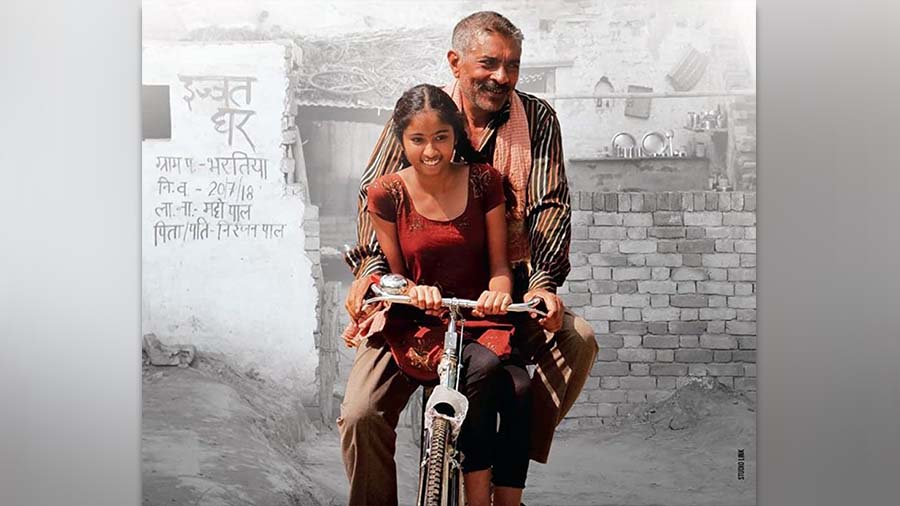Matto Ki Saikil (Matto’s Bicycle) is the kind of film that you want to watch but most often don’t end up watching it. I have missed out on quite a few films like that. But I am glad that I managed to watch this one. The film is about a construction labourer who commutes from his rural village to a nearby city for work.
He works on a daily wage, around Rs 300 per working day. He has to support his family of a wife and two young daughters. The wife falls sick often and the elder daughter is at an age where she should be married off. And for that, Matto will have to arrange a motorcycle as a dowry. Matto’s companion in his daily, and in a way life’s, journey is his bicycle. Hence, the title of the movie.
Matto has been riding this bicycle for nearly 20 years. The cycle is as old as his elder daughter. The bicycle and Matto, both have gone through a lot in their 20-year journey. While there’s no hope to repair the broken (by the system) Matto, he can at least repair his bicycle at a certain Kallu’s bicycle garage. Matto telling Kallu to put a new bell on his cycle is like a father pampering his daughter’s needs. A tractor rolls over his cycle and leaves it impossible to be repaired. This may seem like no big deal for many of us. But buying a new bicycle for Rs 3,000 is too big a task for a daily wager who earns Rs 300 on a working day.
Director M. Gani keeps things simple but stark. The writing is painstakingly real. The language spoken is Braj. But you won’t need subtitles to understand it if you understand Hindi. The cinematography is observant — in a way, depicting our gaze at a section of society that we hardly seem to notice. After all, the daily wage workers are the ones building the high-rise towers and flyovers. They build the infrastructure of the country but it pains to see the dire condition in which their houses are. Matto Ki Saikil shows this disparity with clever writing and smart scene design.
Take, for instance, the employer who hires Matto for a day’s work promising him Rs 300 for the job but pays only 200 at the end of the day, citing nonsensical reasons. He does this after telling someone to invest Rs 3 lakh into something. This is loot. But Matto is too weak because of his circumstances to fight it.
There are many instances like these which I would let you witness. What I must reveal though is the actor playing Matto. Prakash Jha is remarkably sincere as Matto. No ounce of his off-screen affluence reflects in his on-screen scarcity. You don’t feel like you’re watching a renowned filmmaker playing a character. Jha portrays Matto’s helplessness and chaotic silence with a lot of heart. I’m told he spent four-five months getting into the skin of the character. And it shows. This dedication by a filmmaker-turned-actor is worth applauding.
Although the film sounds a bit inconsistent in its dubbing, that’s ignorable. The film moves at a bicycle’s pace, which is how the life of people like Matto moves. They wait for their turn to come without any guarantee that it will definitely come – at a hospital, a police station, or a corporator’s office. And these are the institutes and personnel supposed to serve the needy.
The production design and performances are real. Other than Jha, I quite liked the actor playing Kallu. A scene between Matto and Kallu where they’re walking home sums up Matto’s life and helplessness. He recollects his 20 years’ journey with his bicycle, and tells Kallu, “Dekhte dekhte bees saal nikal gaye, kacchu nay kar paye.” (Twenty years have gone past just like that but I couldn’t achieve anything). Kallu consoles him and lightens the mood and they walk on.
What does Matto dream about? It’s riding a brand-new bicycle, wearing decent clothes, seeing his daughter getting married, and enjoying a kulfi with his wife. The film doesn’t aspire for poetic justice, which is a gutsy effort. I don’t think any mainstream producer would dare go with it. But Jha serves as the producer of the film too. That helps.
In a poignant climax, the director and the actor convey a lot more while speaking a lot less. When I started learning writing and cinema, I was told that if the audience walks out of the theatre chatting after watching a film then the film hasn’t moved them in any way. If the audience walks out silent, then the film has surely touched a chord somewhere. I walked out after watching Matto Ki Saikil, silent, and quickly made my way out of the theatre. I didn’t want the experience of the film to get out of my system so quickly.

